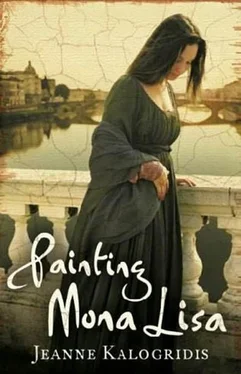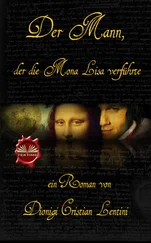We pulled into the Piazza della Signoria. In the windows of the Palace of the Lord Priors, every lamp burned-but this was not our destination. We rumbled to a stop in front of the adjoining building: the Bargello, the prison where I had been held, where Leonardo had been taken by the Officers of the Night. It was a forbidding square fortress crowned by jagged battlements. Great torches burned on either side of the massive entry doors.
As Claudio opened the door, my heart quailed. They have captured Leonardo , I thought. Francesco knows everything. He has brought me here to be questioned … But I showed no outward sign of my turmoil. My face was set as I took Claudio’s arm and stepped lightly onto the flagstone. I thought fleetingly of Zalumma’s knife, at home beneath my mattress.
Francesco stepped from the carriage after me and gripped my elbow. As he directed me toward the doors, I saw wagons waiting nearby-five of them, in a cluster, attended by small groups of grim black-clad men. A keening sound made me turn my head and look at them more closely: A woman, veiled in black, sat atop a wagon, sobbing so violently that she would have fallen had the driver not clutched her.
We made our way inside. I expected to be led to a cell, or to a room filled with accusatory priors. Armed guards scrutinized us as we passed through the entry hall, then outside into a large courtyard. In each of the four corners stood a large pillar, of the same dull brown stone as the building; on each of these pillars were affixed black iron rings, and in each ring burned a torch, which cast wavering orange light.
Against the far wall was a steep staircase leading down from a balcony, and at the foot of those stairs stood a broad, recently constructed platform. Mounds of straw had been scattered on its surface. Beneath the smells of fresh wood and straw was a faint, fetid undercurrent of human waste.
Francesco and I were not alone. There were other high-ranking piagnoni present: seven sweating Lord Priors in their scarlet tunics, a handful of Buonomi , and members of the Council of Eight. Most prominent was the gonfaloniere Francesco Valori, who was serving for the third time in that capacity; a hard-eyed, gaunt man with streaming silver hair, Valori had stridently called for the blood of the accused Bigi . He had brought his young wife, a pretty creature with golden ringlets. We nodded silent greetings, then joined the crowd waiting in front of the low platform. I let go a shuddering breath; I was here as a witness, not a prisoner-at least for now.
People had been murmuring to one another, but they fell silent as a man mounted the scaffold: an executioner bearing a heavy singleedged axe. With him came another man, who set down a scarred wooden chopping block upon the straw.
“No,” I whispered to myself. I remembered my father’s words about the Bigi; I had not wanted to believe them. If I had found a way to see Leonardo, could I have prevented this?
Francesco inclined his head toward mine, to indicate that he had not heard me, that I should repeat myself, but I said nothing more. Like the others, I stared at the scaffold, the executioner, the straw.
The clink of the chains came first; then the accused appeared on the balcony, flanked by men wearing long swords at their hips.
Bernardo del Nero was first. He had always been a dignified white-haired man, with large, solemn eyes and a straight, prominent nose. Those eyes were now puffed almost entirely shut; his nose, twisted and crusted with black blood, was enormously swollen. He could no longer stand straight, but leaned heavily on his captor as he took each halting step down. Like his fellows, he had been forced to surrender his shoes and meet death barefoot.
I did not recognize young Lorenzo Tornabuoni; the bridge of his nose had been crushed, and his face was so bruised and swollen he could not see at all, but had to be led down the stairs. Three other prisoners followed: Niccolò Ridolfi, Giannozzo Pucci, Giovanni Cambi, all of them broken, resigned. None of them seemed aware of the assembly gathered to watch them.
When they at last stood upon the scaffold, the gonfaloniere read the charges and the sentence: espionage and treason, death by beheading.
Bernardo del Nero was granted the mercy of dying first. The executioner asked his forgiveness, and was told, in a frail, thick-tongued voice, that he was forgiven. And then Bernardo squinted out at our small assembly and said, “May God forgive you, too.”
He was too weak to kneel without aid; a guard helped him settle his chin properly into the chopping block’s darkly stained cradle. “Strike neatly,” he urged, as the executioner lifted the axe.
I did not care if I made Francesco proud; I averted my face, closed my eyes. But I opened them again immediately, startled by the warm spray and the collective gasp of the crowd. I caught a sidewise glimpse of Bernardo’s kneeling body falling to one side, of blood spurting in a thick upward arc from its headless neck, of a guard moving forward to retrieve something red and round from the straw.
And suddenly I remembered. Remembered a day years before, in the church at San Marco, when my mother, her gaze fixed and terrible, had stared up at Savonarola in the pulpit. And she had cried out:
Flames shall consume him until his limbs drop, one by one, into Hell! Five headless men shall cast him down!
Five headless men.
I stepped backward, treading on the slippered foot of a Lord Prior. Francesco caught my arm and held me steady. “Nerves,” he whispered to the offended man. “Forgive her; it is only nerves. She is young and unused to such things; she will be fine.”
Guards came and took the corpse away; Tornabuoni was pushed forward, forced to murmur words of forgiveness, to kneel, to die. Two more followed. Giovanni Cambi was last. He collapsed from fear and had to be dragged to the block; he died screaming.
In the end, the straw was sodden. The smell of fresh wood was eclipsed by the tang of blood and iron.
By the time Francesco and I rode home, the darkness had not yet begun to ease. We sat in silence until Francesco abruptly spoke.
“This is what becomes of Medici supporters.” He was watching me curiously. “This is what becomes of spies.”
Perhaps my pallor seemed suspicious; perhaps he spoke simply out of a desire to relish his political victory. In any case, I did not answer. I was thinking of my mother’s words. And I was thinking of my father, and what would happen to him when the prophet was cast down.
A s the weather cooled, the plague’s grip on the city eased. My father returned to his house, Francesco took up with his prostitutes again, and I went to the marketplace and church as often as I could. One morning I placed the book on my night table, even though I had found no new letter in Francesco’s desk, and the next I day went to Santissima Annunziata.
Leonardo was well, to my relief. He had even worked on the painting. The bold outlines and shadows of my features had been softened by the application of light cinabrese , a translucent curtain of flesh. I was beginning to look human.
But when I told him of my father’s warning that the Bigi would pay with their blood-of my anguish that I had not been able to come and warn him-he said, “You bear no guilt. We knew of the danger, well before your father spoke of it to you. If there is any fault, it is mine. I was unable-I could not-bring influence to bear in time. And the horror of it was, even had we been able to arrange a rescue…” He could not bring himself to continue.
“Even if they could have been rescued-they should not have been,” I finished.
Читать дальше
Конец ознакомительного отрывка
Купить книгу












